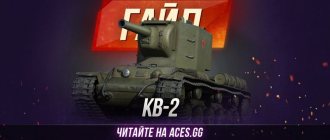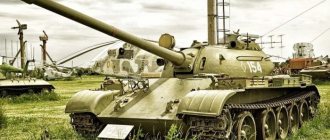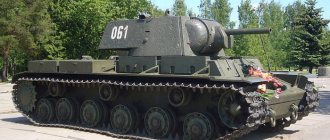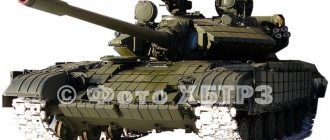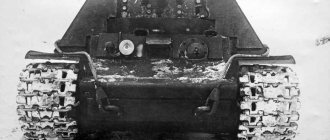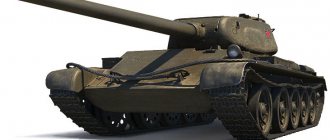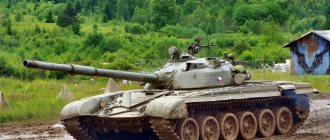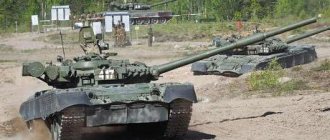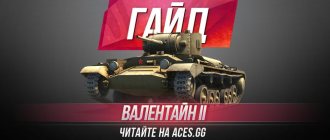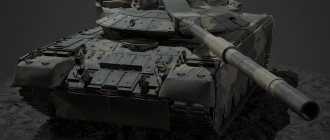IS-7 guide
So, let's start with the basics. The IS-7 has a very convenient development branch for leveling up. Accordingly, when reaching the main prize, players get acquainted with some pretty interesting cars. For example, KV-85.
Article: MAXIMUM ASSEMBLY on IS-7
This tank appeared in the game relatively recently, replacing the legendary Tier 6 “tascher” KV1-S in its combat post. The technique is quickly mastered by beginners and brings a lot of pleasant sensations to experienced players.
In the same branch there is the absolute imbecile of the 8th level IS-3, and its older brother T-10. Both vehicles are also easy to learn, have excellent damage for their level, and provide an opportunity to prepare for the acquisition of the IS-7.
If we talk about the IS-4 branch, everything doesn’t look so rosy. The only tank worth mentioning here is the ST-1. Perhaps someone will say that the KV-4 looks attractive, but on this tank newbies will experience the pain and suffering of slow heavy tanks.
The main criterion for the survival of heavy tanks in a random environment is the safety margin and the thickness of the armor given. The IS-7 cannot boast of the first parameter: 2,150 HP, this is far from the best indicator at the level. But in terms of armor, the Soviet heavy can give odds to any tank in the game.
In addition, the “seven” has greater speed, better dynamics and maneuverability, which allows you to change the direction of attack depending on the developing situation. Of course, the legendary and attractive to many IS-7 is not without its drawbacks. In particular, the ammunition rack is located in the front of the tank, so breaking through the cheeks can lead to critical damage and an explosion.
Let's talk about weapons. On this front, not everything is so rosy and cloudless for the seventh IS. So, a 130-mm S-70 gun is installed on the vehicle. Armor penetration with a basic projectile is 250 mm, one-time damage is 490 units . The rate of fire of the gun is quite acceptable at the level: the tank can deal up to 2,150 units of damage per minute. In principle, the indicator is not phenomenal, however, it is fully consistent with its class of technology. It is worth noting that the characteristics of the gun allow you to do without gold, but for greater confidence and comfort, a dozen sub-caliber shells will not be superfluous.
What really causes dissatisfaction is the accuracy, stabilization and long mixing time. When shooting at long distances, the tank will openly blur. In this regard, the IS-4 looks somewhat more attractive, although in addition to accuracy, the “four” gun is inferior in penetration and one-time damage. A separate line includes uncomfortable vertical guidance angles. The barrel goes down only 6 degrees, which prevents effective play from the terrain.
Links
World of Tanks Resources
- Tank science
- Thread on the official forum
- Recordings of battles on the IS-7
On the Internet
- IS-7 // Wikipedia
- IS-7: a titan that was late to the war // Military history portal Warspot
- Heavy tank IS-7 // Alternative History
- IS-7. Armor, weapons, equipment and tactics. Detailed review from jmr // YouTube
- IS-7 - History in detail from Goose // YouTube
- Hyde Park: Lunokhod. Good old IS-7! // YouTube
USSR technology
| Light tanks | I MS-1 • II BT-2 • II T-45 • II T-26 • II T-60 • II Tetrarch • III BT-SV • III LTP • III M3 light • III BT-7 artillery • III T-116 • III BT-5 • III T-127 • III T-46 • III T-70 • IV BT-7 • IV T-80 • IV Valentine II • V A-20 • V T-50 • VI MT-25 • VI T-50-2 • VII LTG • VIII LTTB • VIII LT-432 • IX T-54 lightweight • X T-100 LT |
| Medium tanks | III T-29 • IV A-32 • IV T-28E with F-30 • IV T-34 with L-11 • IV T-28 • V Matilda IV • V T-34 shielded • V T-34 • VI A -43 • VI T-34-85M • VI T-34-85 Rudy • VI M4-A2 Sherman Lozy • VI T-34-85 • VII A-44 • VII KV-13 • VII T-43 • VII T- 44-122 • VIII Object 416 • VIII T-54 first sample • VIII T-44-100 (B) • VIII T-44-100 (K) • VIII T-44-100 (M) • VIII T-44- 100 (P) • VIII T-44-100 (U) • VIII STG • VIII STG Guardsman • VIII Object 274a • VIII T-44 • IX Object 430 Option II • IX Object 430 • IX T-54 • X Object 140 • X Object 907 • X T-22 sr. • X K-91 • X Object 430U • X T-62A |
| Heavy tanks | V Churchill III • V KV-220-2 • V KV-220-2 Beta-Test • V KV-1 • VI KV-1S • VI KV-2 • VI KV-2 (R) • VI KV-85 • VI Object 244 • VI T-150 • VII IS • VII - 3 • VII KV-122 • VII IS-2M • VII IS-2 shielded • VII IS-2 • VIII IS-3 • VIII IS -6 • VIII IS- 6 H • VIII KV-5 • VIII KV-4 • VIII IS-5 (Object 730) • VIII IS-3 with MZ • VIII KV-4 Kreslavsky • VIII Object 252U Defender • VIII Object 252U • VIII IS-M • VIII Object 703 Option II • VIII IS-2-II • IX T-10 • IX Object 777 Option II • IX Object 257 • IX Object 705 • IX IS-3-II • IX ST-I • X IS-4 • X IS -7 • X Object 260 • X Object 705A • X Object 277 • X Object 279 early • X ST-II |
| Tank destroyer | II AT-1 • III SU-76I • IV SU-85A • IV SU-76M • V SU-85 • V SU-85I • VI SU-100 • VI SU-100Y • VII ISU-122S • VII SU-152 • VII SU-100M1 • VII SU-122-44 • VIII ISU-152 • VIII ISU-130 • VIII T-103 • VIII SU-130PM • VIII ISU-152K • VIII SU- 101 • IX K-91-PT • IX Object 704 • IX Object 263 • X Object 268 • X Object 268 Option 4 |
| self-propelled guns | II SU-18 • III SU-26 • IV SU-5 • V SU-122A • VI SU-8 • VII S-51 • VII SU-14-1 • VIII SU-14-2 • IX 212A • X Object 261 |
Heavy tanks
| USSR technology | V Churchill III • V KV-220-2 • V KV-220-2 Beta-Test • V KV-1 • VI KV-1S • VI KV-2 • VI KV-2 (R) • VI KV-85 • VI Object 244 • VI T-150 • VII IS • VII - 3 • VII KV-122 • VII IS-2M • VII IS-2 shielded • VII IS-2 • VIII IS-3 • VIII IS -6 • VIII IS- 6 H • VIII KV-5 • VIII KV-4 • VIII IS-5 (Object 730) • VIII IS-3 with MZ • VIII KV-4 Kreslavsky • VIII Object 252U Defender • VIII Object 252U • VIII IS-M • VIII Object 703 Option II • VIII IS-2-II • IX T-10 • IX Object 777 Option II • IX Object 257 • IX Object 705 • IX IS-3-II • IX ST-I • X IS-4 • X IS -7 • X Object 260 • X Object 705A • X Object 277 • X Object 279 early • X ST-II |
| German technology | IV Pz.Kpfw. B2 740 (f) • IV Durchbruchswagen 2 • VI Tiger 131 • VI VK 30.01 (P) • VI VK 36.01 (H) • VII VK 45.03 • VII Tiger I • VII Tiger (P) • VIII VK 100.01 (P) • VIII VK 168.01 (P) • VIII VK 168.01 Mauerbrecher • VIII VK 75.01 (K) • VIII E 75 TS • VIII Löwe • VIII Tiger II • VIII VK 45.02 (P) Ausf. A • IX E 75 • IX Mäuschen • IX VK 45.02 (P) Ausf. B • X E 100 • X Pz.Kpfw. VII • X Maus • X VK 72.01 (K) |
| US technology | V T14 • V T1 Heavy Tank • VI M6 • VII King Tiger (captured) • VII T29 • VIII Chrysler K • VIII Chrysler K GF • VIII T26E5 • VIII T26E5 Patriot • M54 Renegade VIII T77 VIII M6A2E1 • VIII T32 • VIII T34 • VIII T34 B • IX AE Phase I • IX Concept 1B • IX M103 • IX T54E1 • X T110E5 • X T57 Heavy Tank |
| French technology | IV B1 • V BDR G1 B • VI ARL 44 • VII AMX M4 mle. 45 • VIII AMX 50 100 • VIII AMX M4 mle. 49 • VIII AMX M4 mle. 49 Liberté • VIII AMX 65 t • VIII Somua SM • VIII FCM 50 t • IX AMX 50 120 • IX AMX M4 mle. 51 • X AMX 50 B • X AMX M4 mle. 54 |
| UK technology | V Churchill I • V Excelsior • VI Churchill VII • VI TOG II* • VII Black Prince • VII FV201 (A45) • VIII Charlemagne • VIII Caernarvon • VIII Caernarvon Action X • IX Conqueror • X FV215b • X Super Conqueror • X T95/ FV4201 Chieftain |
| Chinese technology | VII IS-2 • VIII WZ-111 • VIII WZ-111 Alpine Tiger • VIII • VIII • IX WZ-111 model 1-4 • X • X WZ-111 model 5A • X WZ-111 Qilin |
| Japanese technology | III Type 91 Heavy • IV Type 95 Heavy • V OI Experimental • VI Heavy Tank No. VI • VI OI • VII O-Ni • VIII O-Ho • IX Type 4 Heavy • X Type 5 Heavy |
| Technology of Czechoslovakia | VII Škoda T 45 • VII Vz. 44-1 • VIII Škoda T 56 • VIII TNH 105/1000 • IX TNH T Vz. 51 • X Vz. 55 |
| Equipment Poland | VII 45TP Habicha • VIII 50TP prototyp • VIII 53TP Markowskiego • IX 50TP Tyszkiewicza • X 60TP Lewandowskiego |
| Swedish technology | VIII Emil I • VIII EMIL 1951 • IX Emil II • IX Strv K • X Kranvagn |
Where to shoot the IS-7
So, the frontal projection of the IS-7 turret has an armor thickness of 240 mm, which, taking into account the gun mantlet and the correct placement of the armor plates, provides reliable protection against any weapon in the game. The front part of the hull is covered with 150 mm armor plate. The indicator is not impressive, however, the tank is the happy owner of a “pike nose”, which does not allow it to penetrate the “seven” at a right angle. At the same time, the NLD and cheeks remain vulnerable if the tank tries to tank with a diamond, and experienced players usually have no difficulty finding penetration zones. Therefore, in close combat and clinch it is necessary to constantly “dance”, increasing the chance of a rebound.
The sides are not distinguished by good armor, but they are covered with a narrow screen, which well absorbs hits from cumulative bullets and sub-calibers. Therefore, often even top-end heavyweights do not penetrate the IS-7 with gold. If we continue the analogy with the IS-4, this tank can be penetrated head-on by experienced players without much difficulty, which often serves as a reason for dissatisfaction. At the same time, critics forget about one nuance: the “four” only breaks comfortably at a right angle. An easy turn of the hull, and the tank confidently tanks sideways in front of opponents of any level. Therefore, the IS-7 seems more attractive: it is almost impossible to penetrate the strand at a right angle.
One of the best
The Soviet IS-7 heavy tank was supposed to absorb all the experience of World War II and become a combat vehicle that was head and shoulders above all existing ones. It received excellent protection, powerful weapons and was able to move almost at the speed of a medium tank. The IS-7 was developed in an extremely short time, creating more than 1,500 drawings, using more than 25 innovative ideas that were not typical for tank building, and involving more than 20 scientific institutions.
But for some reason, this innovative tank did not become the basis of the Soviet armored forces; moreover, not a single one of the 50 IS-7 samples ordered left the factory gates.
Equipment on the IS-7
Additional equipment includes a rammer and aiming stabilizer. The last slot is filled variably, but it is better to opt for improved ventilation in order to comprehensively improve all characteristics. There is no choice for combat consumables, so we load an automatic fire extinguisher, a large repair kit and a first aid kit. This set of equipment will significantly increase the vehicle’s chance of survival. If there are problems with silver, premium consumables can be replaced with basic ones.
IS-7 crew
Leveling up the crew skills for the IS-7 differs little from the standard set of any heavy tank in the game. Therefore, we adhere to the following sequence: In addition, it will be useful for the driver of the “Seven” to master the “King of Off-Road” skill, which will help to significantly improve the driving characteristics of the car. It is important to remember that one of the loaders combines his specialization with the duties of a radio operator, so you can master the skill of radio interception. Mandatory perks include combat brotherhood and camouflage.
Sources
- Baryatinsky, Mikhail (2006). ISIS tanks
. Hersham, Surrey: Ian Allan Publishing. ISBN; (13)9780711031623 - Glantz, David M.; House, Jonathan M. (2015). When the titans collided.
How the Red Army Stopped Hitler (revised and expanded (Kindle) ed.). University Press of Kansas. ISBN 978-0-7006-2152-1. - Jentz, Thomas (1995). German Panther Tank: In Search of Combat Superiority
. Atglen, PA: Schiffer Publishing. ISBN 0-88740-812-5 - Jentz, Tom; Doyle, Hillary (1993). Heavy tank Tiger-1 1942–45
. illustrated by Sarson, Peter. Osprey. ISBN 978-1-85532-337-7. - Perrett, Brian (1987). . London: Blandford Press. ISBN 0-7137-1735-1.
- Zaloga, Stephen (1994). Heavy tank IS-2 1944-1973.
. Osprey Publishing. ISBN 978-1-85532-396-4. - Zaloga, Stephen (1996). Heavy tanks KV-1 and 2 1939–1945.
. Osprey Publishing. ISBN 978-1-8553-2496-1. - Zaloga, Stephen; Grandsen, James (1984). Soviet tanks and military equipment of World War II
. London: Arms and Armor Press. ISBN 0-85368-606-8.
How to play the IS-7
We started the review with a comparison of the two top heavyweights of the Soviet development branch. So, the IS-7 is a breakthrough tank that can rush a direction, confidently repelling random hits with its armor. The IS-4 is a defense vehicle capable of confidently defending any city street or exposing its sides to enemy attacks and holding back the onslaught near its base. Speaking of the IS-7, the main task of the tank is to systematically push out the enemy in the chosen direction. At the same time, the vehicle can also protect any of the flanks abandoned by its teammates.
So, taking advantage of the impressive parameters of the given armor, the “seven” needs to hide the NLD and take any hits with the turret. It is worth noting that the frontal armor holds up well the shells fired by a level 10 tank destroyer, so purely theoretically, the IS-7, if properly positioned, is quite capable of holding off an enemy attack on its own. If it is not possible to completely hide the NLD, we use any cover to attack the enemy, turning our cheeks. Here the armor plates are located at good angles, which gives a high chance of ricochet. Thus, you can peek around the corners of buildings and destroyed equipment. The enemy sees only part of the tower and hull, which prevents him from causing damage. Although rare hits can still penetrate the lower armor plate, there is no escape from this: it is impossible to completely hide the tank on open maps. It is important to understand that it is better not to be alone. Not a single tank in the game can withstand several enemies who are attacking en masse, so ideally, the IS-7 should be covered by 1-2 teammates who will not allow the tank to be bypassed from the sides. Remember that the “ seven ” has good dynamics, so it has time to occupy advantageous positions, change directions of attack, or return to defend its base. When meeting fast-firing opponents in a random environment, it is better to clinch with them. This way we neutralize the advantage of the enemy’s weapon and do not allow him to leave the confrontation. When going at point-blank range, you need to constantly aim your sights at the enemy’s gun, preventing him from targeting vulnerable areas. The mechanics of the game are designed in such a way that a shot into the barrel with an armor-piercing projectile does not cause damage, but a high-explosive charge becomes dangerous for the shooter. In a clinch, you shouldn’t “dance” with your opponent, turning your vulnerable cheeks. The IS-7 may well look at the enemy head-on, catching unpenetrated targets and inflicting damage.
Top equipment
| Price | 6,100,000 kr. |
| Strength | 2400 HP |
| Weight/max. | 68.19/70.95 t. |
| Power | 1200 hp |
| Speed | 59.6/15 km/h. |
| Agility | 28 °/s |
| Frame | 150/150/100 mm. |
| Tower | 240/185/94 mm. |
| Ammunition | 30 pcs. |
| Damage | 490/490/640 HP |
| Breakthrough | 250/303/68 mm. |
| Reload | 13.7 sec. |
| GN speed | 25 °/s |
| Angles VN | -6…+18° |
| Review | 400 m. |
| Connection | 720 m. |
